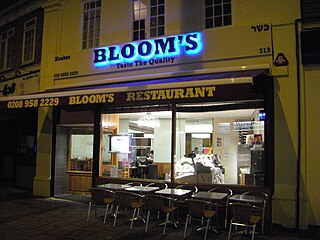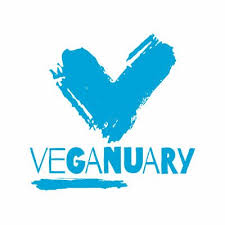Related Research Articles

A meat alternative or meat substitute, is a food product made from vegetarian or vegan ingredients, eaten as a replacement for meat. Meat alternatives typically approximate qualities of specific types of meat, such as mouthfeel, flavor, appearance, or chemical characteristics. Plant- and fungus-based substitutes are frequently made with soy, but may also be made from wheat gluten as in seitan, pea protein as in the Beyond Burger, or mycoprotein as in Quorn. Alternative protein foods can also be made by precision fermentation, where single cell organisms such as yeast produce specific proteins using a carbon source; as well as cultivated or laboratory grown, based on tissue engineering techniques. The ingredients of meat alternative include 50–80% water, 10–25% textured vegetable proteins, 4–20% non-textured proteins, 0–15% fat and oil, 3-10% flavors/spices, 1-5% binding agents and 0-0.5% coloring agents.

A plant-based diet is a diet consisting mostly or entirely of plant-based foods. It encompasses a wide range of dietary patterns that contain low amounts of animal products and high amounts of fiber-rich plant products such as vegetables, fruits, whole grains, legumes, nuts, seeds, herbs, and spices. Plant-based diets may also be vegan or vegetarian but do not have to be, as they are defined in terms of high frequency of plants and low frequency of animal food consumption.

The European Vegetarian Union (EVU) is a non-profit, non-governmental umbrella organisation for vegan and vegetarian societies and groups in Europe. The union works in the areas of vegetarianism, nutrition, health, consumer protection, climate and environment, and food labelling.

Vegetarian and vegan dietary practices vary among countries. Differences include food standards, laws, and general cultural attitudes toward vegetarian diets.

Meatless Monday and Meat Free Monday are international campaigns that encourage people to not eat meat on Mondays to improve their health and the health of the planet.

Gardein is a line of meat-free foods produced by Conagra Brands. In 2003, the company was founded by Yves Potvin, who remained as the CEO of Gardein until 2016. In November 2014, Pinnacle Foods purchased Gardein for $154 million. Pinnacle was acquired by Conagra in 2018.

A kosher restaurant or kosher deli is an establishment that serves food that complies with Jewish dietary laws (kashrut). These businesses, which also include diners, cafés, pizzerias, fast food, and cafeterias, and are frequently in listings together with kosher bakeries, butchers, caterers, and other similar places, differ from kosher-style businesses in that they operate under rabbinical supervision, which requires the observance of the laws of kashrut, as well as certain other Jewish laws, including the separation of meat and dairy.

Suzy Amis Cameron is an American former actress, model, author and activist, who advocates for a plant-based diet.

Military nutrition is the field and study of food, diet, and nutrition in the military. It generally covers and refers to military rations and nutrition in military organizations and environments.
Daniel Humm is a Swiss plant-based chef and owner of Daniel Humm Hospitality, the New York-based hospitality group behind the highly acclaimed Eleven Madison Park, Clemente Bar, and direct-to-consumer lifestyle brand Eleven Madison Home. In September 2024, he was appointed a UNESCO Goodwill Ambassador for food education due to his advocacy for sustainable food systems.

Matthew Kenney is an American celebrity chef, entrepreneur, author, and educator specializing in plant-based cuisine. He is the author of 12 cookbooks, founder of dozens of vegan restaurants, and founder of the companies Matthew Kenney Cuisine and Matthew Kenney Culinary, a plant-based diet education business.
HappyCow is a mobile app and website that lists vegan and vegan-friendly restaurants and also a passionate community of over one million vegan-focused members. Aside from listing restaurants it also lists farmers markets, health food stores and all types of businesses with a vegan focus.

Veganuary is an annual challenge run by a UK nonprofit organisation that promotes and educates about veganism by encouraging people to follow a vegan lifestyle for the month of January. Since the event began in 2014, participation has increased each year. 400,000 people signed up to the 2020 campaign. The campaign estimated this represented the carbon dioxide equivalent of 450,000 flights and the lives of more than a million animals. Veganuary can also refer to the event itself.
A vegan school meal or vegan school lunch or vegan school dinner or vegan hot lunch is a vegan option provided as a school meal. A small number of schools around the world serve vegan food or are vegan schools, serving exclusively vegan food.

The McPlant is a vegetarian burger sold by the fast-food chain McDonald's in several European countries. In 2021, McDonald's partnered with Beyond Meat, a Los Angeles–based producer of plant-based meat substitutes, to create the McPlant platform. It features a plant-based meat alternative burger patty made from plant ingredients such as potatoes, peas and rice.

Lord of the Fries is an Australian and New Zealand casual dining fast food chain. It was originally based in Melbourne, before expanding into other regions. It serves only vegan dishes including loaded fries, veggie burgers, hot dogs and a number of various sides and breakfast items. Due to the menu consisting entirely of plant-based products, all meals from the chain are Kosher and Halal. The restaurants became 100% vegan in 2018. The founders are vegan as are most of the franchisees.
The Fossil Fuel Non-Proliferation Treaty Initiative is a diplomatic and civil society campaign to create a treaty to stop fossil fuel exploration and expansion and phase-out existing production in line with the targets of the Paris Climate Agreement, while supporting a just transition to renewable energy.

Aviv was a Middle Eastern vegan restaurant with several locations in Portland, Oregon. Guy Fieri visited the restaurant for a 2020 episode of the Food Network's Diners, Drive-Ins and Dives. Although Aviv had been popular, it closed in 2021 during the COVID-19 pandemic.

The 2023 United Nations Climate Change Conference or Conference of the Parties of the UNFCCC, more commonly known as COP28, was the 28th United Nations Climate Change conference, held from 30 November to 13 December at Expo City, Dubai, United Arab Emirates. The COP conference has been held annually since the first UN climate agreement in 1992. The event is intended for governments to agree on policies to limit global temperature rises and adapt to impacts associated with climate change.

Plant-Based Universities is an international student-led campaign calling for universities and student unions to adopt fully plant-based catering. The campaign began in late 2021 by Animal Rising with the goal of 100% plant-based catering in universities in response to the climate crisis. Its chapters have initiated votes in students' unions and, as of November 2024, had been successful in one Austrian and twelve British universities, with around 80 active campaigns across eight countries.
References
- ↑ Vegconomist (24 October 2023). "South Korea Becomes Second Country to Embrace National Plan for Plant-Based Foods" . Retrieved 2 November 2023.
- 1 2 신선미 (23 October 2023). "식물성 대체식품 산업 키운다…농식품부, 12월 활성화방안 발표". 연합뉴스 (in Korean). Retrieved 2 November 2023.
- ↑ "Edinburgh becomes first European capital to commit to shift towards vegan diets". The Herald. 18 January 2023. Retrieved 9 January 2024.
- 1 2 PRSD (10 January 2024). "Exmouth signs Plant Based Treaty to reduce town's carbon footprint". the PRSD. Retrieved 18 January 2024.
- ↑ "NGO urges leaders in COP27 to discuss 'plant-based treaty'". aljazeera.com. Archived from the original on 13 November 2022. Retrieved 13 November 2022.
- ↑ Writer, Morgan Owen LA Downtown News Staff (11 November 2022). "LA City Council endorses Plant Based Treaty". Los Angeles Downtown News - The Voice of Downtown Los Angeles. Retrieved 9 January 2024.
- ↑ "Why has this European capital endorsed the Plant Based Treaty?". euronews. 18 January 2023. Retrieved 9 January 2024.
- ↑ Staines, Michael. "Amsterdam backs global 'Plant-Based Treaty' - 'Food has a huge impact on climate'". Newstalk. Retrieved 4 February 2024.
- ↑ "This group has an idea to help save the planet: Everyone should go vegan". USA TODAY. Retrieved 9 January 2024.
- ↑ "Plant-based food gets seat at U.N. climate summit's table". Portland Press Herald. 24 December 2023. Retrieved 8 February 2024.
- ↑ Danish Ministry of Food, Agriculture and Fisheries (2023). "Handlingsplan for plantebaserede fødevarer". fvm.dk (in Danish). Retrieved 2 November 2023.
- ↑ "Denmark publishes world's first national action plan for plant-based foods - GFI Europe". gfieurope.org. 13 October 2023. Retrieved 2 November 2023.
- ↑ "Multi-year strategy for the Plant-Based Food Grant" (PDF). plantefonden.lbst.dk.
- ↑ "NYC Health + Hospitals Now Serving Plant-Based Meals as Primary Dinner Option for Inpatients At All of Its 11 Public Hospitals". NYC Health + Hospitals. Retrieved 10 February 2024.
- ↑ "Eat Plants! - NYC Health". www.nyc.gov. Retrieved 10 February 2024.
- ↑ Shank, Michael (16 January 2024). "How New York City is getting plant-based meals into schools, hospitals, and jails". Fast Company.